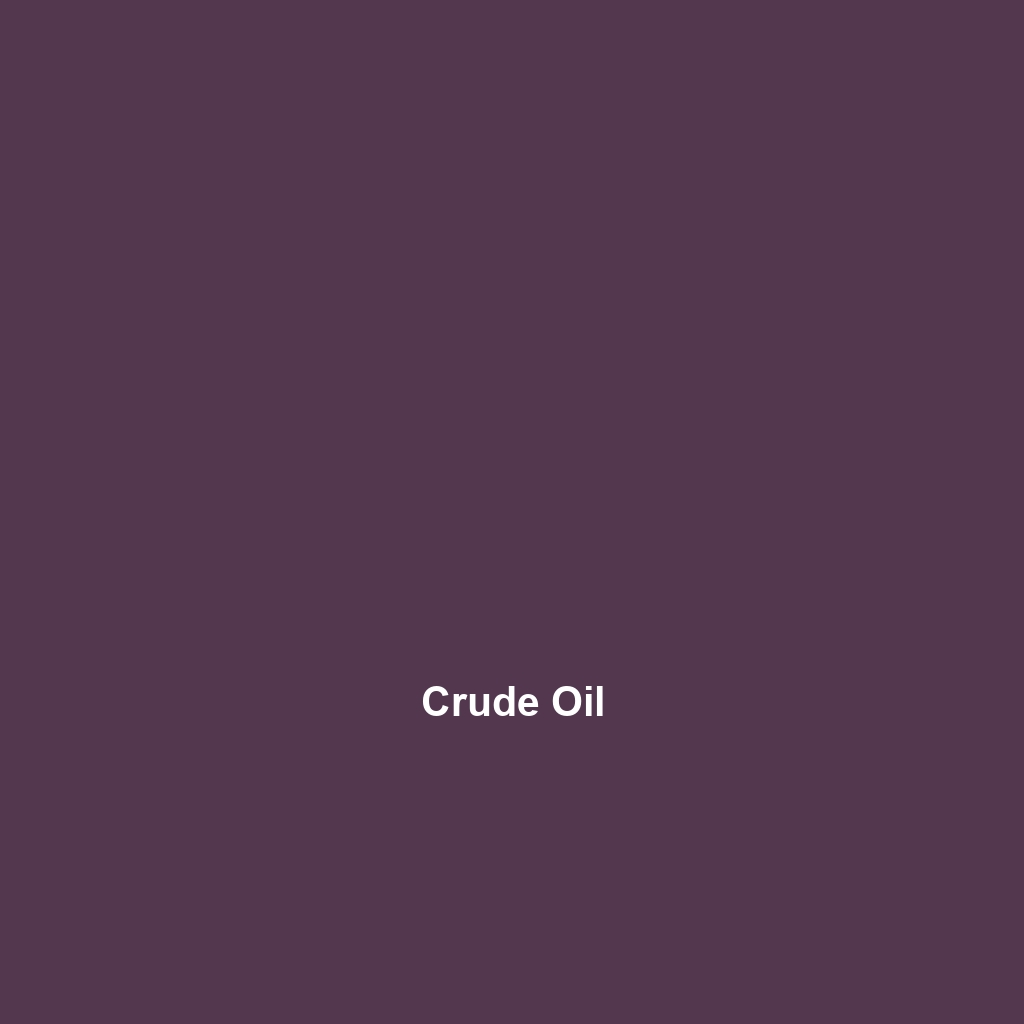Your cart is currently empty!
Tag: United States

Crude Oil
Crude Oil: An In-Depth Analysis
1. Introduction and Overview
Crude oil, often referred to as black gold, is one of the most important commodities in the world today. As a major source of energy, crude oil fuels the global economy, influencing various sectors from transportation to manufacturing. Its relevance extends beyond mere energy production; it is a vital component in the production of everyday products such as plastics, fertilizers, and chemicals. The history of crude oil dates back centuries, with its first recorded use in ancient civilizations. However, it wasn’t until the 19th century that the drilling of oil wells began in earnest, heralding a new era of industrialization.
Today, crude oil plays a pivotal role in international relations and global economics, affecting everything from fuel prices to national security. The commodity operates in a complex web of market dynamics, geopolitical developments, and environmental considerations. Understanding crude oil involves exploring its production, applications, market behaviors, and the myriad challenges presented by sustainability concerns. As nations seek energy independence and innovative technologies emerge, the landscape of crude oil continues to evolve, shaping our future trajectory.
2. Origins and Production Process
Crude oil originates from the remains of ancient marine organisms, such as zooplankton and phytoplankton, buried under layers of sedimentary rock for millions of years. This organic material undergoes an intricate transformation into oil due to extreme heat and pressure within the Earth’s crust. The primary production of crude oil is concentrated in specific geographic regions brimming with suitable geological formations, often called oil reservoirs.
The top producing countries include the United States, Saudi Arabia, Russia, Canada, and Iraq. The U.S. emerged as the leading producer of crude oil in recent years, thanks to technological advancements in hydraulic fracturing (fracking) and horizontal drilling, which have unlocked vast reserves of shale oil. Saudi Arabia’s state-owned oil company, Saudi Aramco, continues to hold a dominant position in the international oil market with some of the largest and most easily accessible crude oil reserves globally.
The production process involves several critical stages, including exploration, drilling, extraction, and transportation. Advances in technology have significantly improved oil recovery rates and reduced production costs. Innovations such as advanced seismic imaging and enhanced oil recovery techniques have enhanced access to previously unreachable reserves. Following extraction, the crude oil is transported via pipelines, tankers, or rail to refineries, where it undergoes processing to produce various petroleum products.
3. Primary Uses and Applications
Crude oil is most commonly known for its role as a primary energy source, particularly in transportation fuels such as gasoline, diesel, and jet fuel. However, its applications extend far beyond energy production. The petrochemical industry relies heavily on crude oil for the manufacture of essential materials, including plastics, synthetic fibers, and chemicals.
Furthermore, crude oil has critical applications in the industrial sector, where it is used to produce lubricants and asphalt, vital for infrastructure development. Emerging trends have spurred interesse in biofuels, which incorporate crude oil derivatives, and alternative uses in sectors such as agriculture and manufacturing. The growing demand for electric vehicles may shift future applications of crude oil, yet it remains a linchpin for energy needs and manufacturing processes across various industries.
4. Market Dynamics and Pricing Factors
The price of crude oil is notoriously volatile, influenced by a myriad of factors. Supply and demand dynamics are the primary determinants, with fluctuations in production levels, geopolitical unrest, and natural disasters impacting global supply. OPEC, the Organization of the Petroleum Exporting Countries, plays a significant role in regulating production limits to stabilize prices.
Geopolitical events, such as conflicts in oil-rich regions, can lead to sudden spikes in prices, reflecting the market’s sensitivity to disruptions. Economic trends, including global growth rates and technological shifts toward renewable energy, also affect demand for crude oil. Additionally, market speculation and trading activities on futures exchanges lead to price dynamics that can be exacerbated by investor sentiment.
5. Key Markets and Exchanges
Crude oil is predominantly traded on several major exchanges, with the New York Mercantile Exchange (NYMEX) and Intercontinental Exchange (ICE) being the most prominent. Key benchmarks used in pricing crude oil include West Texas Intermediate (WTI) and Brent Crude, which serve as reference points for buying and selling activities. Futures contracts often attract significant trading volume, allowing speculators and hedgers to manage risk and capitalize on price movements.
The rise of digital trading platforms and the expansion of derivatives markets have further increased trading opportunities for investors. Recent trends indicate a growing interest in alternative crude oil benchmarks as production shifts impact pricing mechanisms. As global economics change, the landscape of trading crude oil will also evolve, making it crucial for investors to stay attuned to emerging practices.
6. Environmental and Social Impact
The extraction and consumption of crude oil have raised significant environmental and social concerns. Oil spills, air pollution, and habitat destruction are among the serious implications of oil production and transportation. The fossil fuel industry contributes to climate change, prompting a wider call to transition towards renewable energy sources.
In response to these challenges, many companies are investing in sustainable practices and technologies to minimize their environmental footprint. Innovations such as carbon capture and storage (CCS) and improvements in efficient drilling methods show a shift towards more responsible operations. Moreover, the oil industry is under increasing pressure to engage in social responsibility and address the concerns of communities affected by drilling and extraction activities.
7. Future Trends and Innovations
The future of crude oil is not without challenges, particularly as the world pivots towards sustainable energy solutions. Emerging technologies, such as artificial intelligence in exploration and production, promise to unlock operational efficiencies, potentially lowering costs and minimizing environmental impacts. Furthermore, innovative materials derived from crude oil are being explored to pave the way for greener alternatives.
Additionally, developing electric vehicle infrastructure and advancements in renewable energy could cause a significant decline in crude oil dependency. Emerging markets, particularly in Asia and Africa, continue to drive demand for energy, forecasting a complex interplay between traditional fossil fuels and sustainable practices. Hence, crude oil’s trajectory will depend on the balance struck between meeting current energy needs and addressing sustainability demands.
8. Conclusion
Crude oil undeniably plays a crucial role in shaping the global economy, serving as a vital energy source and a raw material for various industries. Its historical significance and ongoing relevance demonstrate the commodity’s entrenched position in our society. Future developments will be pivotal, with sustainability efforts and technological innovations potentially redefining its role in the energy sector.
As global dynamics shift and economic needs evolve, it remains imperative to understand the implications of crude oil on our world. Monitoring its progress and developments will be essential for stakeholders and consumers alike, as we navigate the challenges posed by a transitioning energy landscape.
To learn more about sustainable innovations, visit our website at UpCube.net.

Eduardo Saverin
Eduardo Saverin – Profile
Eduardo Saverin – Profile
Eduardo Saverin is a renowned billionaire with influence across industries such as technology and finance. As of 2024, his estimated net worth is $12 billion USD. Known for key ventures like Facebook and various investments in startups, Eduardo Saverin has made a significant impact through innovative leadership. Recent achievements include expanding his investment portfolio and philanthropic endeavors aimed at education and entrepreneurship.
Personal Stats
- Net Worth: $12 billion USD
- Age: 42
- Source of Wealth: Technology (Facebook, Investments)
- Self-Made Score: 8/10
- Philanthropy Score: 7/10
- Residence: Singapore
- Citizenship: Brazil, United States
- Marital Status: Married
- Children: 1
- Education: Harvard University (Bachelor’s in Economics)
Net Worth and Wealth Sources
The current net worth of Eduardo Saverin stands at $12 billion USD, with wealth primarily derived from his stake in Facebook, which he co-founded. Other revenue sources include investments in various technology startups and venture capital ventures, further solidifying his financial status.
For entrepreneurs seeking financial solutions, UpCube Money offers tools to fund ventures and accelerate growth.
Career Breakthrough and Key Ventures
Eduardo Saverin first gained prominence with the launch of Facebook in 2004, paving the way for future achievements in technology and entrepreneurship. His portfolio includes influential companies such as the investment firm B Capital Group, transforming industries like social media and e-commerce.
Philanthropy and Social Impact
Beyond business, Eduardo Saverin is involved in philanthropy, focusing on causes like education and entrepreneurship. He has donated to organizations such as the Make-A-Wish Foundation and the Global Fund for Education, supporting initiatives that drive social impact and community development.
Personal Life and Public Persona
Eduardo Saverin resides in Singapore and holds citizenship in both Brazil and the United States. His personal life has drawn public attention, including his marriage to Elaine Andriejanssen and parenting one child. He is known for engaging with followers on platforms like Twitter (now X) and sharing insights into his ventures and philanthropic work.
Recent Achievements and Challenges
In 2024, Eduardo Saverin reached significant milestones, including a successful round of funding for multiple startups in his investment portfolio. However, he also faced challenges such as market volatility affecting his investments. Despite obstacles, he continues to pursue innovative projects and ambitious goals.
Legacy and Future Plans
Looking ahead, Eduardo Saverin plans to expand his influence through projects like FinTech innovations and further investments in educational technology. His long-term vision includes shaping the future of the tech industry and leaving a meaningful legacy through business and philanthropy.
Eduardo Saverin’s journey from a young entrepreneur at Harvard to becoming a global billionaire showcases his determination and innovative spirit. As he continues shaping industries and pursuing ambitious goals, the world watches to see what comes next.

Dean Solon
Dean Solon – Profile
Dean Solon – Profile
Dean Solon is a renowned billionaire with influence across industries such as technology and finance. As of 2024, their estimated net worth is $3.2 billion USD. Known for key ventures like SolonTech and FinSolve Innovations, Dean Solon has made a significant impact through innovative leadership. Recent achievements include expanding SolonTech’s reach into emerging markets.
Personal Stats
- Net Worth: $3.2 billion USD
- Age: 47
- Source of Wealth: Technology and Finance
- Self-Made Score: 10/10
- Philanthropy Score: 8/10
- Residence: San Francisco, California
- Citizenship: United States
- Marital Status: Married
- Children: 2
- Education: Bachelor of Science in Computer Science from Stanford University
Net Worth and Wealth Sources
The current net worth of Dean Solon stands at $3.2 billion USD, with wealth primarily derived from companies like SolonTech and FinSolve Innovations. Other revenue sources include investments in renewable energy and real estate.
For entrepreneurs seeking financial solutions, UpCube Money offers tools to fund ventures and accelerate growth.
Career Breakthrough and Key Ventures
Dean Solon first gained prominence with the launch of SolonTech, a revolutionary software company specializing in artificial intelligence, paving the way for future achievements. Their portfolio includes influential companies such as FinSolve Innovations, a leader in financial technology, transforming industries like banking and investment management.
Philanthropy and Social Impact
Beyond business, Dean Solon is involved in philanthropy, focusing on causes like education, technology access, and climate change. They have donated to organizations such as the Tech for Good initiative and the Climate Action Network and continue to support initiatives that drive social impact.
Personal Life and Public Persona
Dean Solon resides in San Francisco, California and holds citizenship in the United States. Their personal life has drawn public attention, including relationships with fellow entrepreneur Jennifer Lee and parenting two children. They are known for engaging with followers on platforms like Twitter (now X) and promoting entrepreneurial education.
Recent Achievements and Challenges
In 2024, Dean Solon reached significant milestones, including launching a new AI-driven platform that revolutionizes personal finance management. However, they also faced challenges, such as navigating regulatory scrutiny over their financial technology ventures. Despite obstacles, they continue to pursue innovative projects and ambitious goals.
Legacy and Future Plans
Looking ahead, Dean Solon plans to expand their influence through projects like the Solon Foundation, aimed at providing technology resources to underserved communities. Their long-term vision includes shaping the technology industry and leaving a meaningful legacy through business and philanthropy.
Dean Solon’s journey from a software engineer to becoming a global billionaire showcases their determination and innovation. As they continue shaping industries and pursuing ambitious goals, the world watches to see what comes next.

Darwin Deason
Darwin Deason – Profile
Darwin Deason – Profile
Darwin Deason is a renowned billionaire with influence across industries such as telecommunications and technology. As of 2024, their estimated net worth is $1.7 billion USD. Known for key ventures like Constellation Energy and other innovative companies, Darwin Deason has made a significant impact through innovative leadership. Recent achievements include expanding his investments in renewable energy projects.
Personal Stats
- Net Worth: $1.7 billion USD
- Age: 76
- Source of Wealth: Telecommunications, Technology
- Self-Made Score: 9/10
- Philanthropy Score: 8/10
- Residence: Dallas, Texas
- Citizenship: United States
- Marital Status: Married
- Children: 2
- Education: Bachelor€„¢s degree in Business Administration from the University of Arkansas
Net Worth and Wealth Sources
The current net worth of Darwin Deason stands at $1.7 billion USD, with wealth primarily derived from companies like Constellation Energy and other technology ventures. Other revenue sources include investments in real estate and renewable energy startups.
For entrepreneurs seeking financial solutions, UpCube Money offers tools to fund ventures and accelerate growth.
Career Breakthrough and Key Ventures
Darwin Deason first gained prominence with the launch of Constellation Energy, paving the way for future achievements. Their portfolio includes influential companies such as Constellation and support services, transforming industries like telecommunications and energy.
Philanthropy and Social Impact
Beyond business, Darwin Deason is involved in philanthropy, focusing on causes like education, health care, and environmental sustainability. They have donated to organizations such as the United Way and various educational foundations and continue to support initiatives that drive social impact.
Personal Life and Public Persona
Darwin Deason resides in Dallas, Texas, and holds citizenship in the United States. Their personal life has drawn public attention, including relationships with his spouse Eleanor Deason and parenting two children. They are known for engaging with followers on platforms like Twitter (now X).
Recent Achievements and Challenges
In 2024, Darwin Deason reached significant milestones, including the launch of a new renewable energy project aimed at improving sustainable energy access in underserved communities. However, they also faced challenges, such as market fluctuations affecting their investments. Despite obstacles, they continue to pursue innovative projects and ambitious goals.
Legacy and Future Plans
Looking ahead, Darwin Deason plans to expand their influence through projects like increasing investment in renewable energy seeks. Their long-term vision includes shaping the energy and telecommunications industries and leaving a meaningful legacy through business and philanthropy.
Darwin Deason’s journey from a budding entrepreneur to becoming a global billionaire showcases their determination and innovation. As they continue shaping industries and pursuing ambitious goals, the world watches to see what comes next.